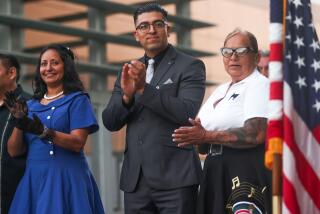Helping the Public Purse
Because the neighborhood was worried about crime, a landlord offered space in his mini-mall so the Police Department could establish a “police drop-in site.” Many locals applauded the additional presence of police officers, who use the space to catch up on paperwork or to make phone calls.
An expanding soccer league needed lighted fields, but lights weren’t in the city’s budget. Parents staged a carnival as a start on raising the needed money.
An affluent community prone to brush fires was concerned that its 18-year-old fire truck was no longer adequate. Residents held a bake sale and auction to raise money for a $300,000 truck they plan to donate to the city. This star-studded affair in Beverly Glen, featuring memorabilia from neighbors Vanna White, Natalie Cole, Jay Leno and Wilt Chamberlain, is the latest example of private citizens trying to supplement public services.
These efforts to bolster municipal finances to meet specific needs raise some questions. When should rich neighborhoods or enterprising parents be able to, in essence, buy more public services than poorer communities? If the residents of Brentwood can raise most of the $2.4 million needed to rebuild their outdated public library, as they did a few years back, what’s fair to other, poorer Los Angeles residents, especially those in communities where celebrity auctions aren’t likely?
The issue is not whether the parks or schools or the Fire Department should permit private groups to supplement public services in this way. Cities and other agencies have long encouraged such private largess. The recession of the early 1990s, which cut into public spending, saw a groundswell of volunteer fund-raisers for public institutions.
Private money of course should not lead to diversion of public resources from neighborhoods that need it. But there are many good reasons to encourage--or at least not bar--private help. Schools, parks and libraries can only benefit from the help of their neighbors, whether that assistance takes the form of money or volunteered time. Indeed, to flourish, these public institutions must have community support and involvement.
But what about equity? If public budgets cannot make up in poorer neighborhoods for what private money can do in wealthier places, public officials can help compensate in other ways. There are some good models. School officials worked with actor Kirk Douglas and his wife, Anne, who are spending $2.5 million to upgrade playgrounds at public schools across the city. School and city officials are working with private groups, including the nonprofit TreePeople, to plant shade trees on sun-baked campuses.
The Recreation and Parks Department has also gone far with this idea of involvement, requiring parks to create their own advisory boards, drawn from the community. These groups help city park directors decide which classes to offer, which sports to emphasize, how money gets spent and even how to encourage private involvement. A good idea, worth expanding beyond the parks.
More to Read
Sign up for Essential California
The most important California stories and recommendations in your inbox every morning.
You may occasionally receive promotional content from the Los Angeles Times.









